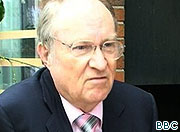The Swiss Government has published proposals which could close down controversial suicide centre Dignitas.
More than 100 Britons have killed themselves at the Dignitas facility in Zurich.
Two options will be presented to the Swiss Parliament, one of which would make assisted suicide centres illegal.
The other option is for tighter controls to be placed on suicide organisations.
The Swiss Justice Minister said: “We have no interest, as a country, in being attractive for suicide tourism.”
Dignitas’ founder, Ludwig Minelli, described the proposals as “outdated and patronising”.
The Federal Government has stated it would favour the regulation option but said it needs to clamp down on suicide organisations.
An official statement said: “Essentially, the Federal Council does not wish to take anything away from the current, liberal legislation, which permits someone to assist a suicide provided they are not motivated by their own interests.”
It added: “However, since assisted suicide organisations are increasingly testing the boundaries of the law, and in some cases evading state and professional monitoring mechanisms, the Federal Council sees an urgent need to lay down guidelines and restrictions.”
The tighter controls on assisted suicide would require patients to present two medical opinions declaring that their disease was incurable, and that their death was likely soon.
The proposed measures would also ensure that the decision to die had been made by someone with enough mental capacity to do so.
The new proposals would also require assisted suicide groups to provide better written records to stop them profiting from patients wanting to die.
In January Ludwig Minelli was accused of breaking the law by profiting from patients’ fees. There were also allegations that the personal possessions of patients had gone missing after their deaths.
Mr Minelli was subjected to investigation by Swiss prosecutors.
In July a former employee of Dignitas spoke out after the double suicide of British couple Sir Edward and Lady Joan Downes.
In reality the Dignitas ‘clinic’ is “just one person who has found a way to make a lot of money out of death and the fear of it”, nurse Soraya Wernli told The Sunday Times.
“There is nothing dignified or uplifting about it”, added Mrs Wernli, whose two and half years at the facility left her concerned that people were committing suicide because they were depressed or felt burdensome.
In Westminster this week an 11th hour bid to legalise assisted suicide failed in the House of Lords after an amendment was withdrawn.
Lord Alderdice had tabled the amendment to the Coroners and Justice Bill.
It would have allowed the assisted suicide of people with an incurable illness provided they had a signed certificate from a coroner confirming that they had a “free and settled” wish to die.
But critics dubbed it “euthanasia on demand”.
Peers pointed out that two previous attempts to legalise assisted suicide had been rejected in the House already.
In July peers voted 194 to 141 against the plan to make it legal to help someone travel overseas to commit suicide.


